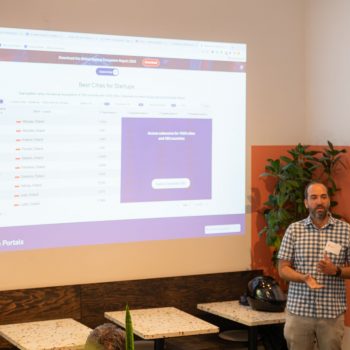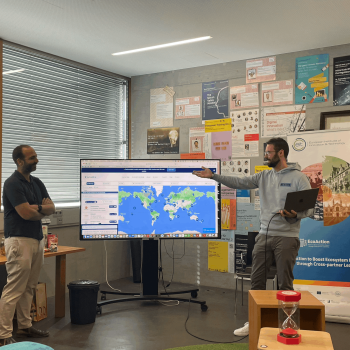The way we work has undergone a remarkable evolution in recent years, driven by the advancements in technology and the widespread availability of the internet. Remote work, a concept once unheard of, has now become a prominent and transformative force in the modern workforce. This shift in work dynamics has had a significant impact on various sectors, including the startup ecosystem.
Once considered a niche concept, it has gained prominence as the internet has become increasingly pervasive. The rise of digital nomads, individuals who embrace the freedom and flexibility of working from anywhere, has been closely intertwined with the evolution of remote work. As technology has advanced, so too has our ability to collaborate and contribute remotely, breaking down geographical barriers and opening up new opportunities for professionals.
In this article, we will explore the impact of it on startup ecosystems. We will delve into the trends that transformed it into the mainstream, the challenges and solutions it presents, and the importance of physical location in nurturing vibrant startup communities.
Benefit from 10% Discount on Deel's Services while Hiring Remotely
Whether you want to hire contractors and employees worldwide without opening legal entities, streamline HR for your global team, or consolidate payroll for everyone — Deel does it all (while keeping you compliant). With StartupBlink, you can benefit all of Deel perks with a 10% discount.
Pandemic as a Catalyst for Remote Work:

The COVID-19 pandemic acted as a profound catalyst for the widespread adoption of remote work, propelling it from a niche concept to the prevailing norm in the working world. As the global health crisis unfolded, organizations swiftly adapted their operations to accommodate remote arrangements, deserting office spaces overnight. This rapid shift showcased its viability and resilience as an alternative.
Businesses reevaluated strategies and embraced remote work to ensure operational continuity. Leveraging technology, companies implemented remote work policies and relied on communication tools, project management platforms, and virtual meetings. The necessity of remote work during the pandemic not only demonstrated its efficacy but also dispelled doubts about its feasibility.
Moreover, the pandemic challenged conventional notions of work, highlighting benefits for both employers and employees. Flexibility, improved work-life balance, and reduced costs resonated with companies and individuals alike. This shift in mindset has made remote work a viable long-term solution.
While remote work offers numerous benefits, it also presents unique challenges, particularly when it comes to insurance, employment, and legal matters. One of the main hurdles arises when employees are spread across different countries or cities, as each jurisdiction may have its own set of regulations and requirements. Navigating the complexities of international employment contracts, tax obligations, and benefits can be daunting for both employers and employees.
Challenges and Solutions:

Fortunately, innovative solutions have emerged to address these challenges and streamline remote arrangements. Platforms like Deel have stepped in to provide comprehensive solutions that ensure legal compliance and facilitate seamless work experiences. Deel helps companies navigate the intricacies of international employment by offering contract templates, managing payroll and benefits, and ensuring compliance with local laws and regulations. These solutions not only mitigate legal risks but also provide peace of mind for employers and employees alike.
By leveraging these platforms, companies can establish robust and legally sound remote work arrangements. They can confidently hire talent from around the world, knowing that the necessary legal and administrative processes are taken care of. This not only simplifies the complexities of remote work but also enables companies to tap into a global talent pool, unlocking a vast array of skills and perspectives.
In summary, while challenges exist in navigating insurance, employment, and legal issues in remote work setups, platforms like Deel offer solutions that streamline and facilitate these arrangements. By providing comprehensive services, these platforms alleviate the burden of legal compliance and enable companies to fully harness the benefits of remote work while expanding their talent pool globally.
Pushback from CEOs:
Despite the rising popularity of remote work, some CEOs are advocating for employees to return to the traditional office environment, adding an intriguing dimension to the impact of it on startup ecosystems.
While remote work offers benefits like flexibility and access to a wider talent pool, these executives argue that in-person collaboration and face-to-face interactions are essential for fostering innovation and maintaining a strong company culture. They believe that physical proximity enables spontaneous conversations, creative problem-solving, and deeper connections among team members.
Moreover, CEOs express concerns about potential drawbacks of remote work, such as reduced productivity, difficulty in maintaining team cohesion, and blurred work-life boundaries. They contend that the office environment provides a structure for productivity and better monitoring and management of employees.
While the pushback from CEOs is notable, it is important to acknowledge the proven success of remote work for many companies and individuals. The ongoing debate highlights the diverse perspectives within the business community and emphasizes the need for organizations to carefully consider their unique circumstances and goals when determining the optimal work arrangement for their teams.
Limitations on Startup Ecosystems:
Remote work has its merits, but its limitations in impacting startup ecosystems must be acknowledged. While it offers flexibility and access to global talent, it may not be conducive to fostering vibrant startup communities.
In-person interactions and connections are ingrained in human nature and crucial for the success of startup ecosystems. Face-to-face networking, collaboration, and idea-sharing create unique opportunities and fruitful partnerships that drive innovation and attract investors. Startup hubs like San Francisco, New York, and London have established themselves as epicenters of entrepreneurship, providing a concentrated pool of talent, resources, and support networks.
However, in an entirely remote work environment, the development of such startup hubs is compromised. The absence of physical locations inhibits organic community growth and diminishes the immersive experience of being part of a vibrant ecosystem.
Striking a balance between remote work and in-person interactions is crucial. Embracing remote work for talent access and flexible arrangements is valuable, but recognizing the significance of physical locations is equally important. A hybrid approach that combines remote work advantages with in-person collaboration allows startups to leverage global talent while nurturing local ecosystems.
Importance of Physical Location:

While remote work offers flexibility and convenience, it is essential to recognize the significance of face-to-face interactions and the tangible presence of entrepreneurs in specific geographic areas for the success of startup communities. Physical location provides a platform for invaluable face-to-face interactions that foster collaboration, creativity, and the exchange of ideas. Shared spaces like coworking offices and startup incubators enable entrepreneurs to engage in spontaneous discussions, brainstorming sessions, and problem-solving encounters. These organic interactions often lead to unexpected synergies, partnerships, and mentorship opportunities that drive growth and innovation.
Networking is also greatly facilitated by physical location. Events, meetups, and conferences held in specific regions serve as hubs for networking and knowledge sharing, enabling entrepreneurs to connect with like-minded individuals, industry experts, investors, and potential customers. Building a strong professional network through in-person interactions is invaluable and cannot be replicated in a purely remote environment.
Additionally, physical location creates unique opportunities that may not exist in remote work settings. Concentrated startup ecosystems in specific cities or regions attract venture capitalists, angel investors, and other key players in the entrepreneurial ecosystem. The proximity to these stakeholders increases the chances of securing funding, mentorship, and vital resources that can propel startups to new heights. Physical location also fosters a sense of community and belonging, as entrepreneurs share a common space, support one another, and contribute to the overall growth of the ecosystem.
Enhanced Talent Pool:
One of the remarkable advantages of remote work is the ability for companies to tap into an enhanced talent pool that transcends geographical boundaries. By establishing a headquarters or base in a specific location while employing individuals from around the world, companies can access a diverse range of high-quality talent that may not be readily available locally.
Hiring globally not only enriches the skill set and expertise within the organization but also fosters a diverse and inclusive work environment. Moreover, remote work provides opportunities to bridge the gap between developed and developing countries. It enables companies to source talent from regions where skilled professionals may be seeking remote opportunities but lack local job prospects. This creates economic opportunities and promotes the growth of talent in underserved areas, contributing to a more equitable distribution of employment opportunities worldwide. In addition, this mode of work also offers cost-saving benefits for companies. By hiring remote workers, companies can reduce overhead expenses associated with maintaining a physical office space.
Examples of Fully Remote Companies:
Several companies, such as Zapier, GitLab, and Telegram, have successfully embraced fully remote work arrangements, demonstrating the feasibility and success of operating without a central physical office. These companies operate on a global scale, with team members distributed across various locations and time zones. They prioritize effective communication, leverage technology, and establish robust remote cultures. These examples showcase the potential of remote companies and inspire other organizations to explore remote options while finding the right balance for their specific needs.
About Us:
StartupBlink is the world’s most comprehensive startup ecosystem map and research center, working with over 100 government entities worldwide. StartupBlink’s global startup ecosystem map has tens of thousands of registered startups, coworking spaces, and accelerators, creating a robust sample of innovation globally.
Our Partners:











